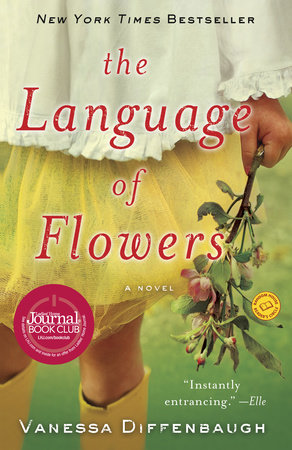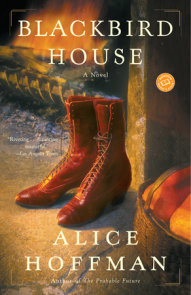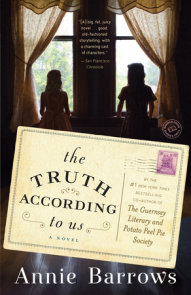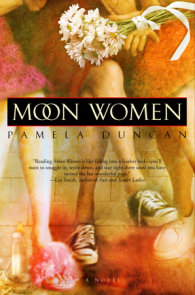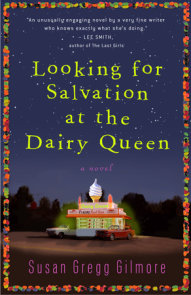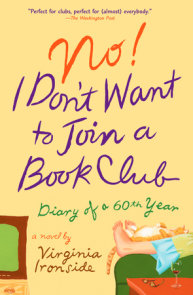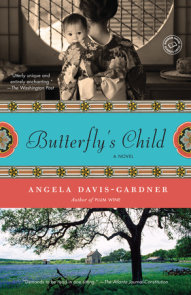READERS GUIDE
Questions and Topics for Discussion
1. A Conversation with Kate Penn and Vanessa Diffenbaugh
Kate Penn is the editor-in-chief of Floral Management Magazine, pub- lished by the Society of American Florists.
Kate Penn: What was your inspiration for this novel?
Vanessa Diffenbaugh: I started with the idea of writing a novel about the foster-care system. I’d been a foster parent for many years, and I felt it was an experience that had not been described well or often. The same sensationalized stories appear in the media over and over again: violent kids, greedy parents, the occasional hor- rific child death or romanticized adoption—but the true story of life inside the system is much more complicated and emotional. Foster children and foster parents, like children and adults everywhere, are trying to love and be loved, and to do the best they can with the emo- tional and material resources they have. With Victoria, I wanted to create a character that people could connect with on an emotional level—at her best and at her worst—which I hoped would give readers a deeper understanding of the challenges of growing up in foster care.
Kate: I found it fascinating that someone like Victoria, who is so hardened on the outside, is able to find solace in something as soft and sensitive as flowers—yet it was believable. What was your inspi- ration for her character?
Vanessa: The hardest part of writing this novel was finding the right balance in Victoria’s character. I wanted her to be tough, distrustful, and full of anger: all characteristics that would be true to her his- tory of being abandoned at birth and never knowing love. But I also wanted the reader to root for her—to understand her capacity to be gentle and loving, even before Victoria understands it herself. So in the first fifty pages of the novel she spends much of her time nurturing plants: smoothing petals, checking moisture, and cradling shocked roots. This felt like the perfect way to show both sides of her character, long before it would have been possible for me to describe her displaying affection or kindness toward another human being.
Kate: There are so many heart-wrenching chapters in Victoria’s life: when she sets the fields on fire after having made so much progress with Elizabeth; when she gives up her baby because she feels un- worthy of her love. Were these heart-wrenching to write, or do you separate yourself from your characters?
Vanessa: They were very hard to write—the scenes with the baby es- pecially. The majority of this novel flew out of me; I wrote five or six pages a day, even when I only had a few hours to work. But the scenes with the baby were different. I could often write only a sentence or two before I had to go and lie down. It was intense to be inside the head of a woman on the verge of neglecting her own child, yet telling this part of Victoria’s story felt essential to me. I had recently become a new mother myself, and I understood the challenge of caring for a newborn even within the context of a supportive family. Because of this, it was easy for me to imagine the overwhelming emotions of trying to parent completely alone, as Victoria attempts to do, and I wanted the reader to feel these emotions as well. Victoria wants desperately to be a good mother, but she lacks the support, re- sources, and self-confidence to succeed. The result is heartbreaking, as it is for so many women who find themselves unable to care for their children. It is my belief that we could prevent much child abuse and neglect in our country if we understood the intense challenge of motherhood and offered more support to women who want to love and care for their families.
Kate: You clearly love and appreciate flowers—but do you have a favorite?
Vanessa: I do love flowers—and it’s hard to choose just one! My favorites vary with the season and the occasion. I have flowers that I adore visually (anemone) and others I favor for their meaning (gentian: intrinsic worth). But here are my all-time favorites: cherry blossoms (the combination of exquisite beauty and fleeting imper- manence always takes my breath away), tulips (the vivid colors; the way they continue to grow even when cut, as if they are reaching out to declare their love), and ranunculus (the red, orange, and pink combined—I don’t think anything could be more radiant).
Kate: Mother Ruby plays a small but important role in the novel, and I found her absolutely enchanting. Tell me about your inspira- tion for her, and why she is important to the story.
Vanessa: With a debut novel, readers are often curious about what aspects of the book are based on the author’s own life; Mother Ruby and Victoria’s home birth are two of the aspects of the book that feel the most personal. My first child was born at home, and I had a phenomenal midwife. She had been delivering babies for almost three decades when I met her, and her intuition—her ability to know exactly what to do and say to support a healthy delivery—was astounding. There’s a line in my book where Mother Ruby says: “You’re the only one that can get this baby out.” This is something my midwife said to me during my labor, and it was a turning point in my delivery. There are so few moments in life like this: when you’re faced with a challenge that you, and you alone, have the ability to solve. But giving birth, especially at home, far from the accou- trements of modern medicine, is one of them. In that moment I understood that it was just me and my body, and I knew I had to get it done. When it came to writing Victoria’s birth scene, this moment felt right not just for the birth but as a turning point for her charac- ter. There were so many things she was trying to avoid, and, finally, here was one thing she had no choice but to face. Then, when she saw that she was capable of the task before her, it changed something inside her in a very permanent way.
Kate: There are parts of the novel—particularly when Victoria works with Renata and then develops her own client base—that sug- gest that flowers have an almost magical power, the ability to help someone discover her unique gifts, or even achieve her dreams. Was this your intent—and do you think flowers indeed have a magical power?
Vanessa: The power of flowers has been well documented: A study from Rutgers University shows that flowers increase feelings of en- joyment and satisfaction, and Harvard researchers found that people feel less anxious and more compassionate in the presence of flowers. But I never meant for the flowers in my book to be seen as magical. I believe that Victoria’s success comes from her ability to listen, ask questions, and help her customers identify exactly what they are looking for in their lives. Earl, for example, comes into Bloom asking for flowers that will make his wife “happy”—but when pressed, he re- alizes it isn’t happiness at all that he’s looking for, but rather con- nection and communication. So many people walk around with a vague feeling of discontentment without ever understanding what it is that’s making them feel dissatisfied. Through her conversations with her customers, Victoria helps them become clear about what it is they want in their lives. The bouquets she creates for them are physical manifestations of these desires, and when customers leave her shop with flowers in their hands, they do so believing change to be imminent. In my experience, it is this belief that has the power to transform lives.
Kate: I so want to believe that children who are raised in the foster- care system, under less than ideal circumstances, possibly suffering from attachment disorder, can eventually learn to love themselves and others, as Victoria does. Based on your experience fostering chil- dren, can this happen? If so, what does it take?
Vanessa: I absolutely believe they can, and there is new research that offers proof it is possible. For many years, severe attachment disor- ders were thought of almost like a life sentence. Study after study il- lustrated that early relationships between caregivers and infants actually shape the circuits of the brain and lay the foundation for later developmental outcomes—from academic performance and in- terpersonal skills to physical and mental health. But new research out of the Center for the Developing Child at Harvard University shows that the brain retains its ability to change far into life. Learn- ing to securely attach at any time in one’s life—to a caregiver (as Vic- toria does with Elizabeth) or even to a partner (as Victoria does with Grant)—has the ability to “rewire” circuits in the brain. This is hope- ful research for those like Victoria, who are determined to overcome the trauma they have experienced and learn to love themselves and others.
Kate: Do you have any particular hopes about what readers might take away from the book, or how reader perspectives, actions, and attitudes might change as a result of experiencing Victoria’s journey? That readers will turn to flowers to communicate their feelings? Or have more empathy and understanding of individuals in the foster care system?
Vanessa: Yes, both! I’ve heard so many readers say they will never look at flowers the same way again, and I certainly felt this way after learning about the Victorian language of flowers. It has been such a fun discovery for me. Sending a message through flowers—especially now, when technology has made most communication instant and digital—feels extremely satisfying. Of course, not all my readers will feel this way (and some will never forgive me for attaching a negative definition to their favorite flower!) but I do hope that many find as much joy in giving and receiving message-laden flowers as I have.
In terms of foster care, I have already seen an incredible out- pouring of support for young people transitioning out of the sys- tem. Readers all over the country have connected with Victoria’s journey and want to know what they can do to help. In an attempt to harness this generosity of spirit, I have helped to launch a nonprofit organization, Camellia Network. The mission of Camellia Network is to activate networks of citizens in every community to provide the critical support young people need to transition from foster care to adulthood. We are specifically reaching out to book clubs, because we believe that small groups of concerned citizens have the power to change outcomes for youth emancipating in their communities. Visit our website (www.camellianetwork.org) to get more details about how you can help.
2. Review by Paula McLain
Paula McLain is the New York Times best-selling author of The Paris Wife. She grew up in Fresno, California where, after being abandoned by both parents, she spent fourteen years in the foster-care system. A graduate of the MFA program at the University of Michigan, she has taught literature and creative writing for many years, and cur- rently lives with her children in Cleveland, Ohio.
I feel it’s only fair to warn you, dear reader, that Vanessa Diffen- baugh’s central character, Victoria Jones, is going to break your heart three ways from Sunday. She’s also going to make you want to pick her up, shake her, and scream, why can’t you let yourself be happy? But for Victoria, the answer is as complex as the question is simple. She’s spent her childhood ricocheting through countless foster and group homes, and the experience has left her in pieces. Painfully isolated and deeply mistrustful, she cares only about flowers and their mean- ings. She herself is like a thistle, a wall of hard-earned thorns.
When we first encounter Victoria, it’s the day of her eman- cipation from foster care, her eighteenth birthday. Emancipation couldn’t be a more ironic word for this moment. For Victoria, as for most foster-care survivors—myself included—freedom really means free fall. She has nowhere to go, no resources, no one who cares about her. She ends up sleeping in a public park, tending a garden of pil- fered blossoms and living on her wits. Only when a local florist sees Victoria’s special way with flowers is she given a means to survive.
But survival is just the beginning. The more critical question is, will Victoria let herself love and be loved?
The storyline weaves skillfully between the heavy burden of Victoria’s childhood—her time with Elizabeth, the foster mother who taught her the language of flowers and also wounded her more deeply than Victoria can bear to remember—and the gauntlet of her present relationship with Grant, a flower vendor who’s irrevocably linked to the darkest secret of her past. At its core, The Language of Flowers is a meditation on redemption, and on how even the most profoundly damaged might learn to forgive and be forgiven. By opening up Victoria’s very difficult inner world to us, Vanessa Diff- enbaugh shows us a corner of experience hidden to most, with an astonishing degree of insight and compassion. So hold on, and keep the tissue box nearby. This is a book you won’t soon forget.
3. Questions for Discussion
1. What potential do Elizabeth, Renata, and Grant see in Victoria that she has a hard time seeing in herself?
2. While Victoria has often been hungry and malnourished in her life, food ends up meaning more than just nourishment to her. What significance does food take on in the book?
3. Victoria and Elizabethbeth struggle with the idea of being par tof a family. What does it mean to you to be part of a family? What defines family?
4. Why do you think Elizabeth waits so long before trying to patch things up with her long-lost sister Catherine? What is the impetus for her to do so?
5. The first week after her daughter’s birth goes surprisingly well for Victoria. What makes Victoria feel unable to care for her child after that week ends? And what allows her to ultimately rejoin her family?
6. One of the themes of the book is the idea of forgiveness, of second chances—do you think Victoria deserves a second chance after the things she did (both as a child and as an adult)? What about Catherine? And Elizabeth?
7. What did you think of the structure of the book—the alternating chapters in the past and the present? In what ways did the two storylines parallel each other, and how did they diverge?
8. The novel touches on many themes (love, family, forgiveness, second chances). Which do you think is the most important? And what did you think was ultimately the book’s lesson?
9. At the end of the novel, Victoria learns that moss grows with- out roots. What does this mean, and why is it such a revelation for her?
10. Based on your reading of the novel, what are your impressions of the foster-care system in America? What could be improved?
11. Knowing what you now know about the language of flowers, to whom would you send a bouquet, and what would you want it to say?






